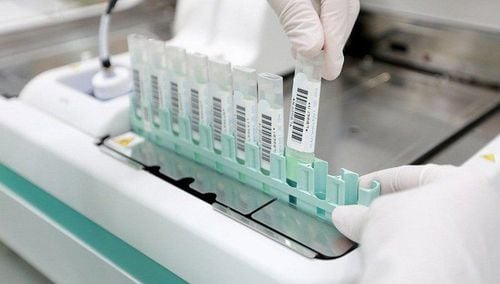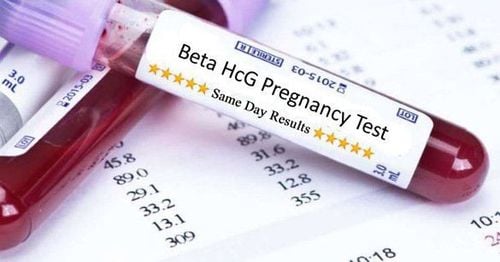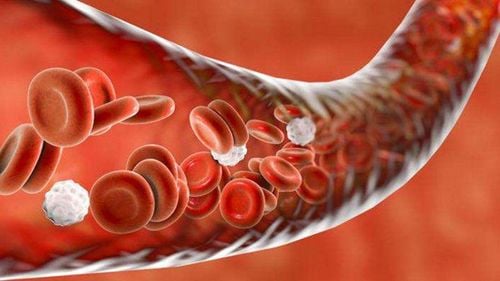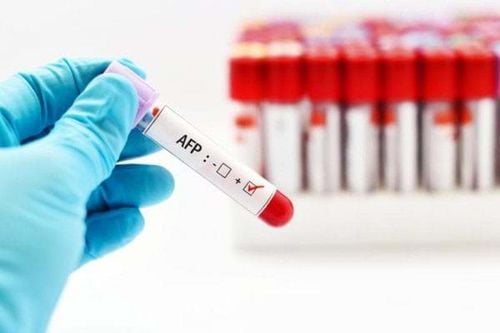This is an automatically translated article.
The article is professionally consulted by Master, Doctor Do Thi Hoang Ha - Doctor of Biochemistry - Laboratory Department - Vinmec Hai Phong International General Hospital.Magnesium is an essential mineral for the human body. A deficiency or an excess of magnesium will first manifest in an increase or decrease in the concentration of magnesium in the blood. Therefore, the blood magnesium level test is the method to help measure the amount of magnesium in the blood.
1. The role of magnesium in the human body
After potassium, magnesium is the second most abundant intracellular cation in the body, an important mineral and a cofactor for hundreds of enzymes. Magnesium is involved in many important functions in the body, including energy production (involved in ATP formation), nucleic acid synthesis, structural function, bone formation, cell a variety of enzymes, ion transport, protein, cell signal transport. Magnesium is also an essential ion involved in maintaining normal neuromuscular function and in the formation of blood clots during hemostasis.In adults, the body contains about 25 grams of magnesium, the daily amount of food provides about 500mg (mainly in foods rich in chlorophyll) and 50 to 60% of magnesium is found in the bones in the form of conjugates. combined with calcium and phosphorus, the rest is in soft tissues. Only a very small amount of magnesium (about 1% of total body magnesium) is found in the blood, so blood magnesium levels reflect the amount of magnesium in the body, but it is not comprehensive and does not complete the body's magnesium stores. . Magnesium has specific roles for the human body as follows:
Magnesium can support the body's synthesis of Vitamin D as well as calcium homeostasis. People prone to magnesium deficiency are those who have digestive disorders, kidney diseases or drink a lot of alcohol because magnesium is absorbed in the small intestine by an active process that depends on 1-25-(OH)2 vitamins. D is also reabsorbed in up to 95% by the kidney. Inadequate nutrition or low serum magnesium levels can predispose patients to cardiovascular diseases, osteoporosis and metabolic disorders. Therefore, magnesium helps to prevent such diseases. Magnesium sulfate is used in obstetric care to prevent seizures in pregnant women with preeclampsia or eclampsia. In addition, magnesium also plays a role in preventing brain damage in premature babies.
2. Indication for blood magnesium level test
The Magnesium test is used to determine the concentration of magnesium in the blood. Abnormal blood magnesium levels are commonly seen in diseases or causes of kidney failure or excessive magnesium absorption in the intestines. Magnesium blood tests are used to assess the extent of kidney problems and/or uncontrolled diabetes and aid in the diagnosis of digestive disorders.Blood magnesium testing is indicated in the following cases:
Find the cause of nerve and muscle problems (eg, muscle twitching, irritability, muscle weakness) Find the cause of low blood pressure , nausea and vomiting, diarrhea, dizziness, muscle weakness, slurred speech. Blood magnesium levels are tested to monitor kidney function as well as to find the cause of heart problems or shortness of breath. Blood magnesium testing is indicated when low calcium or potassium levels do not improve with treatment. This test is also ordered to look for drug-induced changes in magnesium levels. This method is also indicated to evaluate people with heart problems that need treatment with magnesium, because low magnesium levels can increase the risk of cardiovascular diseases such as arrhythmias, affecting people's lives. sick. Magnesium blood test for medical treatment.

3. Procedure and clinical significance of blood magnesium concentration test results
3.1. Procedure for testing magnesium levels in the blood Step 1: The medical staff will wrap a gauze around the upper arm to stop the blood flow. This procedure is intended to make the veins below the garo larger so it is easier to insert the needle into the vein to draw blood Step 2: Clean the hemostatic site with alcohol. Then, place the needle into the vein and attach a tube to the needle to fill it with blood. Step 3: Remove the bandage when enough blood has been drawn for the test and place a gauze pad over the needle site when the needle is removed. Step 4: Apply pressure to the blood collection site and then bandage it. There is very little risk of complications from having blood drawn from a vein. You may have a small bruise at the site where the blood was drawn. In rare cases, after the blood is drawn, the vein may become swollen, called phlebitis. The patient does not need to fast before the blood draw, but should stop using the drug containing nagie salt at least three days before the blood test.
3.2. What is a normal blood magnesium level? A blood magnesium level test can be performed on the patient:
Serum (reflects extracellular magnesium): The blood sample will be collected in a test tube without anticoagulant. Red blood cells (reflecting the amount of magnesium in the cells): A blood sample will be taken in a test tube but containing the anticoagulant heparin lithium, The normal value of the test is also known as the reference range, because it can vary. in different laboratories as well as in different biological populations. That reference range is as follows:
Serum magnesium concentration in adults: 0.70 - 0.95 mmol/l (according to Mayoclinic labs) Serum magnesium concentration in children > 2 years of age: 0.66 - 1.07 mmol/l (according to Mayoclinic labs) Mayoclinic labs) Serum magnesium concentration in neonates up to 2 years: 0.66 - 1.11 mmol/L (according to Mayoclinic labs) RBC magnesium concentration 2.25 - 3.00 mmol/l 3.3. Clinical significance of test results In normal healthy subjects, magnesium concentrations will be within the values of the reference range. In addition, serum magnesium levels may increase or decrease depending on diet, drug use or disease.
Cases of hypermagnesemia may occur due to:
Due to the use of drugs: Drugs such as diuretics, enemas, magnesium-containing bleach, gastric acid-neutralizing drugs containing magnesium in patients with renal failure, solution Magnesium infusion or excessive use of lithium carbonate can lead to hypermagnesemia. Patients with diseases such as Addison's disease, adrenalectomy, severe dehydration, untreated diabetes, hyperthyroidism, hypothyroidism, multiple myeloma...
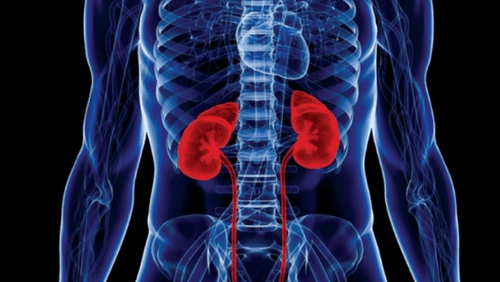
Cases of hypomagnesemia are often caused by the following reasons:
Decreased absorption from the gastrointestinal tract: The reduction in absorption in the gastrointestinal tract is often due to digestive disorders, Crohn's disease, malabsorption syndromes, addicts Chronic alcoholism, celiac disease, surgery to remove part of the small intestine, or radiation enteritis can all cause magnesium deficiency. Vitamin D deficiency causes hypomagnesemia: In some cases, vitamin D deficiency is also the cause of reduced magnesium absorption, thereby leading to hypomagnesemia. Loss of magnesium through the urine: In case the patient has tubular damage, glomerulonephritis or chronic pyelonephritis, tubular necrosis, polyuria due to diabetes, or after eliminating the cause of the obstruction Diuresis and use of diuretics can lead to hypomagnesemia. Endocrine and metabolic disorders causing hypomagnesemia: Diseases such as diabetes mellitus, parathyroid gland disorders, phosphate depletion, hyperaldosteronism, hypercalcemia, patients with ketoacidosis or excessive lactation. May cause hypomagnesemia. Due to drugs: The use of many diuretics as well as antibiotics or Digitalis and anti-cancer drugs, cyclosporin can also cause magnesium in the body to decrease. In addition, people with improper nutrition, pancreatitis, people having to undergo dialysis, pregnancy toxicity, magnesium fixation in bones due to excessive bone formation or extracellular fluid volume increase. Cells, severe burns, sweating, ... can all cause a decrease in magnesium levels in the body. In some cases, a blood magnesium test may be done along with testing for other electrolytes, such as calcium, because magnesium and calcium levels in the body are closely related.

Please dial HOTLINE for more information or register for an appointment HERE. Download MyVinmec app to make appointments faster and to manage your bookings easily.





